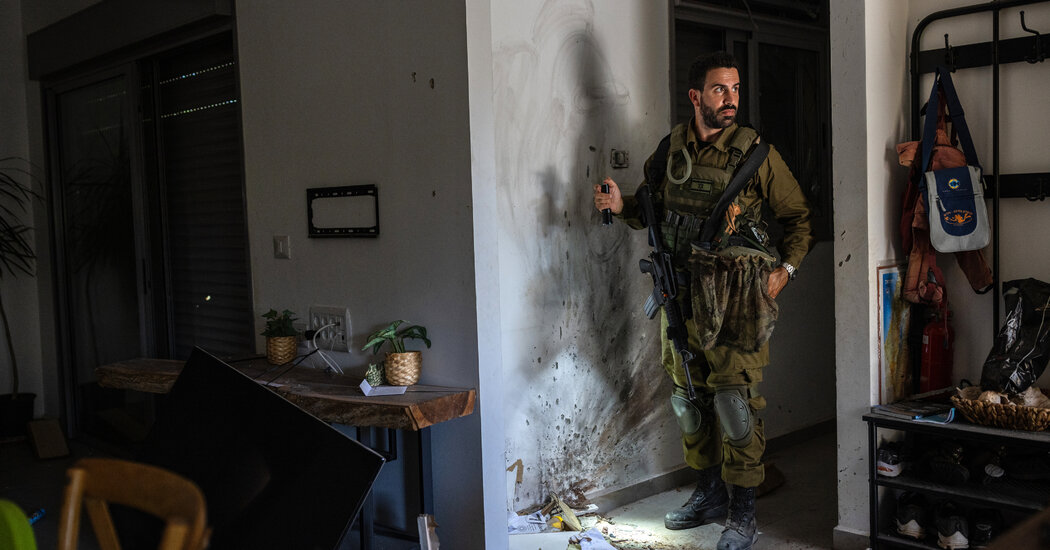All but one of the 13 Israeli hostages released on Friday were abducted from Kibbutz Nir Oz, an Israeli village close to the Gaza border where Hamas militants took more than 70 people on Oct. 7.
Family members said they were thankful that 12 hostages taken from the kibbutz had been returned home to Israel, but that was only “a drop in the bucket,” said Larry Butler, 73, a Nir Oz resident who survived the attack. Of the estimated 215 hostages who remain in Gaza, roughly 30 percent of them are from Nir Oz.
Per capita, Nir Oz is the Israeli village most affected by the Oct. 7 assault.
That day, roughly 100 Nir Oz residents were killed or abducted — one quarter of the village’s prewar population.
On Friday night, the survivors felt some sense of salvation as 12 of their neighbors and relatives — ranging from Yaffa Adar, 85, to Aviv Asher, 2 — were driven to safety by the Red Cross through Egypt to Israel.
“Is that my grandmother?” a young girl cried out after residents identified Margalit Moses, 78, their neighbor from Nir Oz, waving from a Red Cross vehicle.
But that elation was tempered by a wider feeling of loss.
“There are kids here without parents, parents without kids, and grandparents with grandchildren but no parents,” Mr. Butler said.
“See the baby over there?” he said, pointing to a newborn cradled in a woman’s arms. “The husband is in Gaza.”
The village was founded in 1955 as a collective farm whose members pooled their resources and earnings.
The village’s surviving residents describe their hometown as a left-leaning community, dominated by people who hoped for peace with the Palestinians across the border in Gaza, even as most Israelis lost hope in a negotiated peace settlement.
Mr. Butler, a Philadelphia native who fought in Vietnam as a marine, moved to Nir Oz in 1974 because the community — some of them soldiers turned peace activists — embraced him at a time when Americans turned their back on veterans.
But after the Oct. 7 attack, Mr. Butler said his commitment to peace had been shaken.
Thirty of Mr. Butler’s friends were killed and sixty were abducted, he said.
“I trusted them,” Mr. Butler said about his Palestinian neighbors. “I was completely wrong,” he added.
After much of the village was destroyed on Oct. 7, most of the survivors moved en masse to a hotel in Eilat, a resort city on the Red Sea.
The mood in the hotel swings rapidly between normality to grief.
Earlier this week, packs of Nir Oz kids ran around barefoot in the hotel lobby, seemingly oblivious to the trauma around them.
Suddenly one boy, about 10 years old, paused his play. “What’s that? I’m hearing shooting,” he said, imagining a semiautomatic weapon only he could hear.
On Thursday evening, when uncertainty about the impending hostage deal was at its peak, Idan Cunio, 8, came up to his mother, Paula Cunio, 38, to announce that he heard on the news that his twin cousins were going to be released.
“He’s just saying what he wants to be true,” Ms. Cunio said.
The Cunio family has four family members still in captivity: David Cunio, 33, his partner Sharon Alony Cunio, 44, and their twins Emma and Yuli.
Sharon’s sister, Danielle Alony, 44, and her daughter Amelia, 5, were set free on Friday.
Irit Lahav, 57, who has spent most of her life in Nir Oz, said that being together in the hotel has brought the community together. “We already were like a family,” she said. “But now it’s more like a hugging family.”
However, the Nir Oz residents were recently warned that their time in Eilat is coming to a close.
In mid-December, they will be moved to an apartment complex in Kiryat Gat, a small, uncelebrated city in central Israel, for a year. This will jeopardize the communal fabric the kibbutz has worked so hard to maintain, residents said.
“Who will you meet, just your neighbors in the apartment building?” asked Ms. Lahav.
For Ms. Lahav, an avid triathlete, the five-minute walk from the hotel to the Red Sea has been an upgrade from the hourlong drive from Nir Oz to the Mediterranean.
Even so, her training has been on pause because her bike is still chained up in Nir Oz. The attackers left it intact, but they stole Ms. Lahav’s keys, and it’s still too dangerous to bring in a locksmith to cut the lock.
In Kiryat Gat, Ms. Cunio plans to devote her time to figuring out what’s next. “We’re starting from scratch,” she said. “The life we had before is over.”
The community will be saving rooms for the hostages, but until they are released, Ms. Cunio does not know how they will fit into the future of the kibbutz
One thing is for certain, Ms. Cunio said: She and many other survivors will not be going back to the kibbutz. “There’s nowhere to return,” she said.
Patrick Kingsley contributed reporting from Jerusalem.
